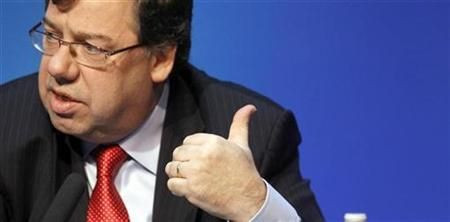COLUMN: Ireland to cannibalize its workforce to fix economic woes
Ireland to rely on its own pension fund to help rescue its troubled economy

It has been about two and a half centuries since one of Ireland’s most famous authors, Jonathan Swift, suggested that the nation’s wealthy eat the children of its poor citizens as a way of dealing with poverty in his satirical essay, “A Modest Proposal.”
Well, according to some, Swift's originally sardonic proposal might not be that far-fetched, as the nation’s government, for the first time, plans to use a portion of its 24-billion euro National Pension Reserve Fund (NPRF) to buy its struggling debt.
Sources say that the proposal, which is unprecedented for the NPRF, will further erode the fund and leave Irish workers with little or no retirement assets. Approximately 10 billion euros from the fund already was earmarked in November to help bail out the country’s three largest banks, Bank of Ireland, Anglo-Irish Bank Group Plc and Allied Irish Banks, Plc. The move comes after the country was granted 85 billion euros in bailout money in November from the European Union and the International Monetary Fund.
One official from Ireland’s Labour Party said “This is a move (using the NPRF assets) of desperation. Basically, we’re cannibalizing ourselves. Our workers will be left with no retirement assets as we use it to bail out our banks right now, which are the entities that caused us to be in this mess in the first place.”
Brian Lucey, an economist at Trinity College, quipped that “the P (in NPRF) stands for pension, not Ponzi.”
The NPRF was created in 2000 as a supplement to municipal pension funds in the country, and was originally forbidden to invest in Irish debt.
However, others say the country has no choice but to use the assets from the NPRF, as foreign investors are not showing much interest in buying the country’s debt. For example, The Swiss National Bank already announced earlier this month that it would no longer buy Irish government bonds because they fell below the required AA-/Aa3 ratings.
The yield of the benchmark 10-year Ireland government bond is near now an all-time high of 8.6 percent as prices have sharply dropped since 2008. The mean yield of the 10-year since 1991 is 5.72 percent.
Michael Taft, economic research advisor at Unite Union, The British Isles' largest union organization, said it was not a big deal.
“The pension fund (NPRF) is somewhat of a misnomer. It was set up in 2000 to be used to help fund the parment of public sector pensions. We’re one of the few countries that has such a fund, and the fund is still open to us as our economy still suffers.”
Taft did say, however, that the money is being misspent.
“Actually, the term ‘cannibalizing’ is correct. The real crime is that we didn’t use the bailout money from the IMF and the EU to shorten the duration of our debt and build infrastructure, which would have decreased unemployment and raised tax revenues.”
Calls to officials at the offices of Brian Lenihan, Ireland’s finance minister, and at the National Treasury Management Agency, which oversees the NPRF, were not returned.
The proposal also comes in the midst of political turmoil. Over the weekend, Brian Cowen resigned as leader of his party, the Fianna Fail Party, although he remained as Prime Minister. Additionally, the country’s Green Party also cut off its ties with Fianna Fail.
The country’s Fine Gael, in close association with its Labour Party, are expected to take over and decide further how the 85 billion euros in bailout money will be used.
© Copyright IBTimes 2024. All rights reserved.





















